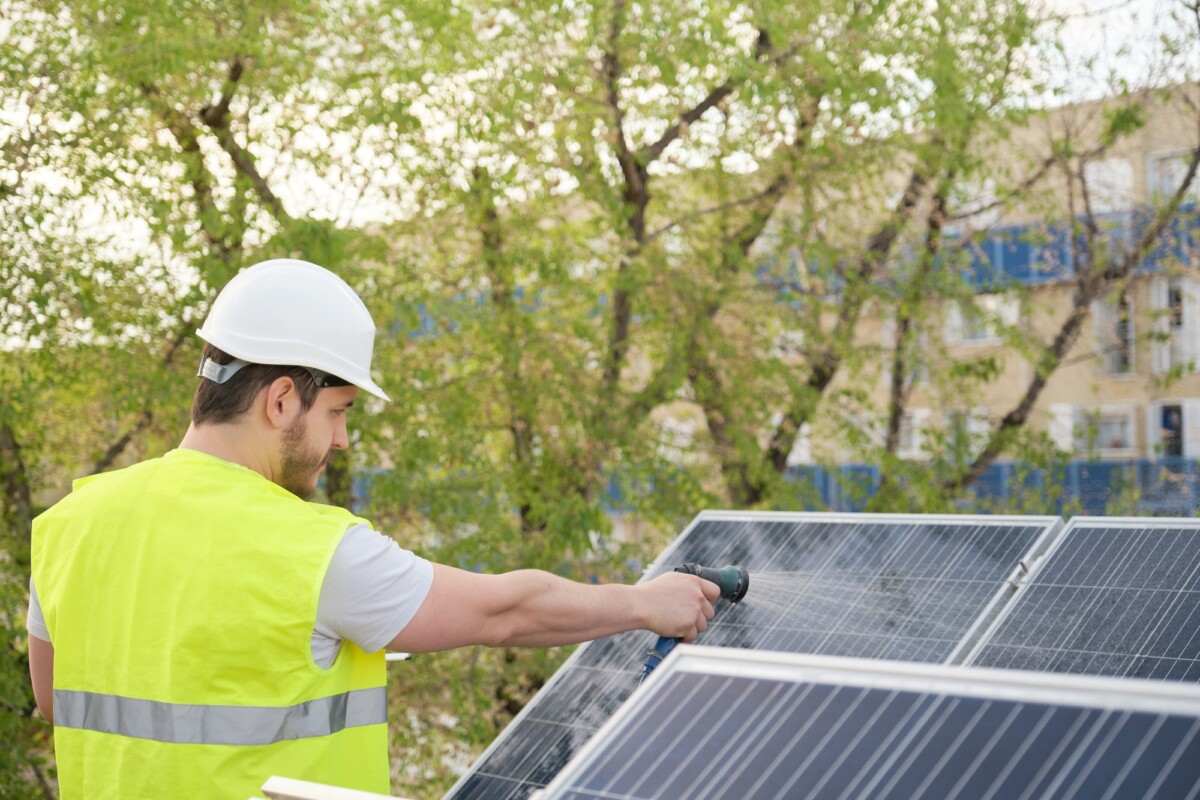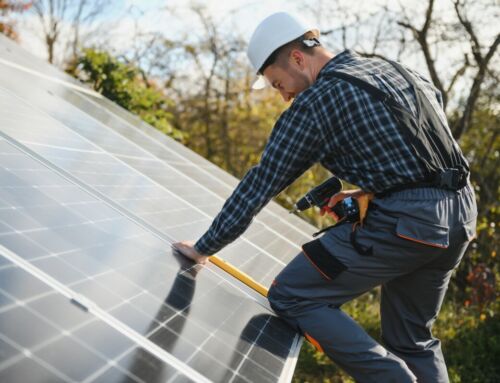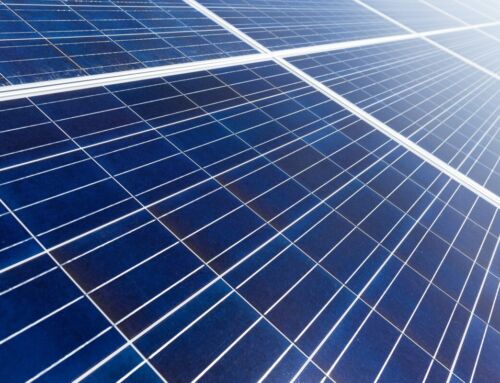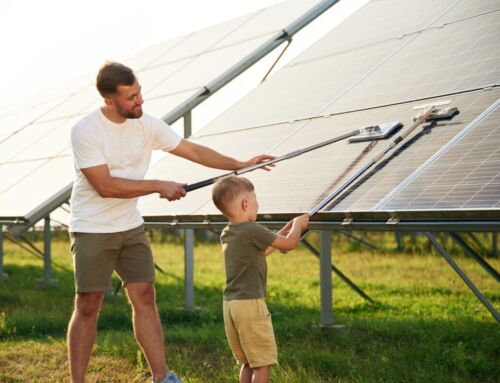Does cleaning solar panels help improve energy output and efficiency? The simple answer is yes, and the reasons go beyond what you might expect. As solar power systems become more common across the U.S., both homeowners and commercial property owners are looking for ways to maximize their solar investment. One of the most overlooked yet essential maintenance tasks is cleaning the panels. Despite advancements in panel technology and claims of “self-cleaning” coatings, dirt, dust, and debris still accumulate over time. This buildup can significantly reduce the amount of sunlight that reaches the solar cells, ultimately decreasing power generation.
When you install solar panels, you’re making a long-term investment not just in energy but also in sustainability and financial savings. Like any investment, it requires care and attention. Yet many people assume that panels are maintenance-free or that rain will handle the cleaning. While rain does help, it rarely provides a thorough wash, especially in areas prone to dust, pollution, pollen, or bird droppings.
Imagine driving your car with dirty headlights or trying to see through a windshield smeared with grime. Your visibility and performance would suffer, right? The same principle applies to solar panels. When particles block sunlight, the panels cannot absorb energy efficiently. Even a small amount of obstruction can lead to noticeable energy losses, which, over months and years, add up to lost savings.
In this detailed guide, we’ll explore how cleaning affects solar panel performance, when and how it should be done, and whether hiring professionals is worth the cost. You’ll also find a helpful table outlining the pros and cons, plus answers to common questions homeowners have about solar maintenance. Let’s dive into why this simple task can make a big difference in your solar system’s performance.
What Does Cleaning Solar Panels Involve
Cleaning solar panels means removing any buildup of dirt, dust, leaves, bird droppings, or other debris from the glass surface of the panels. This buildup reduces the amount of sunlight that reaches the photovoltaic (PV) cells beneath the glass. These cells convert sunlight into electricity, and any obstruction affects their ability to function at full capacity.
Cleaning is usually done with soft materials and water to avoid scratching the glass. This can include:
-
A soft brush or sponge
-
A low-pressure hose or bucket of water
-
A squeegee or non-abrasive cloth for drying
The goal is to gently clean the panel surface without damaging the protective coating. Some people use mild, non-detergent soap, although this is not always necessary unless the residue is sticky or greasy.
For commercial arrays or large-scale solar farms, automated cleaning systems or professional services may be used. These are especially beneficial for areas where manual cleaning would be unsafe or impractical.
How Dirt and Debris Affect Solar Panel Performance
Solar panels work by absorbing sunlight through their glass surface. When that surface becomes coated with grime, even slightly, less light reaches the cells underneath. This leads to reduced electricity generation.
Here’s how different types of debris affect performance:
-
Dust and Pollen: These form a thin layer that scatters sunlight. Over time, even a light dust coating can reduce output by up to 5 to 10 percent.
-
Bird Droppings: These block light completely where they land and are not washed away by rain. They can cause “hot spots,” which lead to long-term panel damage.
-
Leaves and Organic Matter: When left unchecked, they decompose and stick to the panel, attracting moisture and insects.
-
Pollution Residue: In urban and industrial areas, particles from vehicle emissions and factories settle on panels, reducing efficiency.
Studies have shown that the loss of efficiency due to soiling can range from 5 to 30 percent, depending on environmental conditions and panel tilt. Over time, this can translate into hundreds of kilowatt-hours lost.
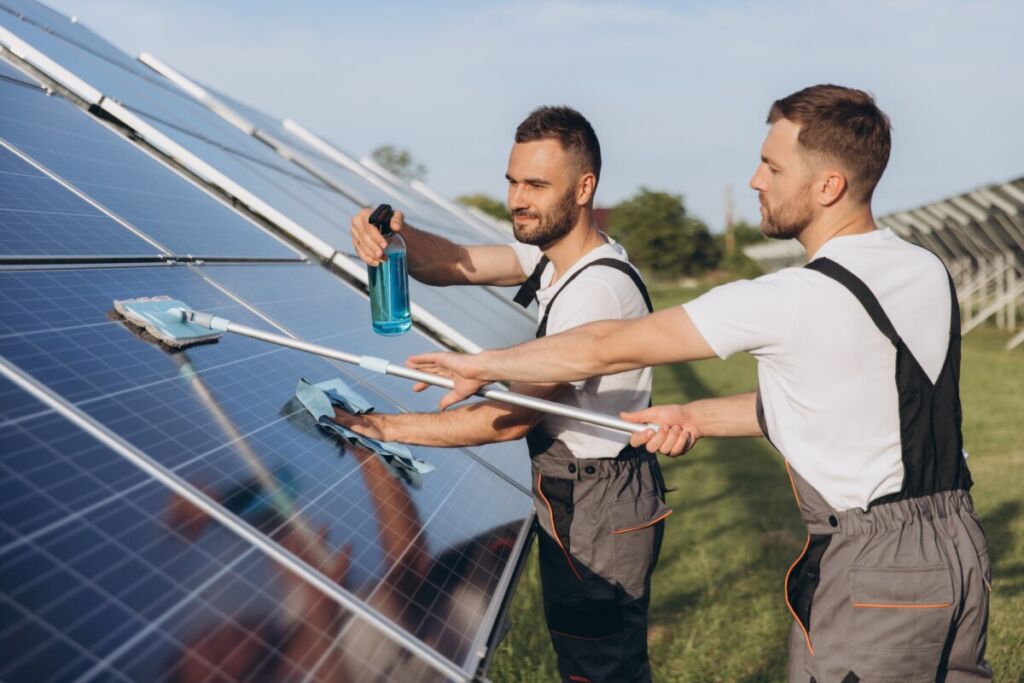
Thinking about solar energy? See how it can lower your bills and elevate your home’s efficiency. Get Your Free Estimate at NewSolar Quotes
Key Factors That Determine Cleaning Frequency
Not all solar panel systems require frequent cleaning. The need depends on several environmental and location-specific factors:
Geographic Region
-
Desert areas like Arizona or Nevada accumulate more dust and sand, which stick to panels during dry spells.
-
Coastal regions may suffer from salt buildup, which can cause corrosion and light blockage.
Rainfall and Weather
-
Frequent rainfall may reduce the need for manual cleaning but won’t remove all debris, especially sticky ones like sap or bird droppings.
-
Dry climates require more frequent cleaning since rain is not available to rinse panels naturally.
Panel Tilt
-
Flat panels trap more dirt and water, leading to streaks and deposits.
-
Angled panels tend to self-clean more effectively during rain, but only partially.
Nearby Pollution Sources
-
Living near:
-
Farms (pollen and dirt)
-
Factories (soot and grime)
-
Construction zones (cement dust and sand)
-
-
All these contribute to faster buildup and more frequent cleaning needs.
Best Practices for Cleaning Solar Panels
Cleaning solar panels is relatively simple if done properly. Here are some best practices to follow:
-
Use a soft-bristled brush or sponge to scrub lightly.
-
Avoid pressure washers which can damage seals or the glass itself.
-
Use plain water or mild soap if needed; avoid chemicals or strong detergents.
-
Clean during early morning or late evening when panels are cool to prevent thermal stress.
-
Always prioritize safety, especially if panels are on a roof. Use proper fall protection or hire a professional if necessary.
Table: Pros and Cons of Cleaning Solar Panels
| Aspect | Pros | Cons |
|---|---|---|
| Energy Efficiency | Increases solar output by removing dirt and debris | Benefit may be small in low-soiling regions |
| Long-Term Savings | More power generation means greater utility savings | May involve upfront cost if hiring professionals |
| Panel Longevity | Prevents hotspots and corrosion from debris buildup | Risk of damage if done improperly |
| Aesthetics | Cleaner appearance on rooftops or ground mounts | Time-consuming for DIY efforts |
| Early Damage Detection | Cleaning allows for visual inspections and spotting cracks or wear | Requires physical access which may not be safe or easy |
How to Decide Between DIY and Professional Cleaning
DIY Cleaning is Suitable When:
-
Panels are easily accessible from the ground or a single-story roof.
-
You’re comfortable using ladders or extension tools.
-
The dirt is mostly surface-level and not hardened residue.
Professional Cleaning is Best When:
-
Panels are installed on steep or high roofs.
-
You notice persistent drops in output even after rainfall.
-
You want inspection and cleaning done together for peace of mind.
Professional services often use specialized equipment like soft water systems, extendable poles, and monitoring tools to ensure thorough, safe, and efficient cleaning.
Financial and Environmental Impact of Clean Panels
The improved efficiency of clean panels directly translates to more energy generated, less dependence on the grid, and greater cost savings. For example, if your solar system is rated to produce 10,000 kWh per year, and dirt reduces output by 10 percent, that’s 1,000 kWh lost annually. At an average cost of 15 cents per kWh, this is $150 in lost value each year.
In terms of environmental impact:
-
Higher solar output means lower reliance on fossil fuels.
-
Fewer grid withdrawals help reduce strain on public infrastructure.
-
Extended panel life reduces electronic waste and replacement costs.
5 Frequently Asked Questions
1. Does cleaning solar panels help even in rainy regions?
Yes, because rain often leaves behind mineral deposits, dust trails, or water spots. While it helps rinse panels, it rarely does a complete job.
2. How often should I clean my panels?
Generally, every six months is a good rule, but it can vary. In dusty or high-pollen areas, quarterly cleaning is better. Monitor energy output to determine if cleaning is needed sooner.
3. Is it safe to walk on solar panels for cleaning?
No, you should never walk directly on panels. They are not designed to bear weight and may crack or break under pressure. Always clean from the side using extension tools or hire a professional.
4. Will cleaning void my solar panel warranty?
No, cleaning itself does not void warranties, but using improper tools or chemicals might. Always follow the manufacturer’s guidelines and avoid abrasive materials.
5. Can solar panels clean themselves?
Some newer panels come with hydrophobic or anti-dust coatings, but these only reduce buildup; they do not eliminate the need for periodic cleaning.
Final Thoughts
So, does cleaning solar panels help? The evidence is clear. Clean panels operate more efficiently, produce more electricity, and last longer. They also reduce your electricity bill and carbon footprint over time. Whether you choose to clean your panels yourself or hire a professional, regular maintenance is a small effort that leads to big returns. For any solar system, maximizing sunlight exposure is the key to maximizing value.
Don’t wait until your system shows a significant drop in performance. Make cleaning a regular part of your solar maintenance routine and protect your energy investment for years to come.
Switch to solar and start saving now! Don’t miss out on a cleaner, cost-effective energy solution. Schedule Your Free Consultation at NewSolar Quotes
Discover more ways to save with solar! Visit New Solar Quote and see the potential for your home.

